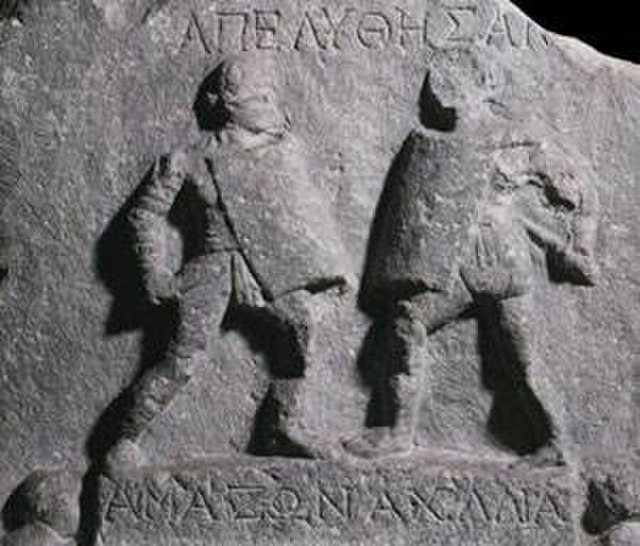Homer’s Odyssey is the most
familiar work of ancient literature besides Aesop’s Fables. It has been
translated into most world languages and transformed into countless operas,
plays, novels, poems, paintings and video games. Its second half, narrating
Odysseus’ return to Ithaca, has recently
been made into an emotional and realistic movie filmed in Greek and Italian sea-washed
locations. Directed by Uberto Pasolini and starring Ralph Fiennes and Juliette
Binoche, its UK release is imminent. Christopher Nolan’s fantasy-action film of
the entire epic, which features Matt Damon as Odysseus, astounding special
effects, supernatural encounters with immortal nymphs and the enormous Cyclops,
is due to dazzle us next year. I hope this mass-market cultural prominence draws
attention to Dan Mendelsohn’s sonorous new
translation of the original poem.
His
rendering of the epic into its authentic metre, the dactylic hexameter, has
been keenly anticipated; in his memoir-cum-literary-interpretation An
Odyssey: A Father, a Son, and an Epic (2017), he revealed his intense
personal engagement with the story, especially Odysseus’ relationship with his
son Telemachus as the young man is initiated into Bronze Age manly protocols. Mendelssohn’s
skill as translator of Greek verse has also been demonstrated in his sensitive
translations of another admirer of the Odyssey, C.P. Cavafy (2009-2012).
Some
of his innovations, such as glossing proper names with their meanings (‘Eurýalos
Broad-Sea’), are illuminating to the Greekless reader. His metrical dexterity
comes over in the pleasing rhythms he’s found for even the most formulaic of
lines: ‘She of the bright owl-eyes, the goddess Athena, addressed him’, where
the long vowels of the spondaic ‘bright owl-eyes’ are emphasised by the
surrounding patter of dactyls.
His
translation of the Odyssey’s celebrated opening couplet is an
aesthetic manifesto in itself:
Tell me the tale of a man, Muse, who had so many roundabout
ways
To wander, driven off course, after sacking Troy’s hallowed
keep.
The alliteration (T/t, m/M, w/w), the
enjambement (continuing the phrase beyond the line-end) and the sweet variety
of emphasised vowels in the second line (a-oy-a-ee), suggestive of Ezra Pound’s
commitment to ‘tone-leading of the vowels’ in sung verse, remind us forcefully
that Homeric epic was enjoyed in oral performance accompanied by a lyre. A
comparison with the other 21st-century attempt at a hexameter Odyssey
(2002), by Rodney Merrill, a former Berkeley Professor of English, is instructive:
Tell me, Muse, of the man versatile and
resourceful, who wandered
many a sea-mile after he ransacked
Troy’s holy city.
This is far less euphonious. It also specifies
that Homer’s notoriously ambiguous epithet ‘polutropos’ means qualities
of character, where Mendelsohn’s ‘who had so many roundabout ways /To wander’
leaves the types of wandering—experiential, psychological, geographical—open to
interpretation. His shrewd decision to avoid the standard ‘city’ for the ptoliethron
of Troy reminds us that this ‘keep’ was no modern conurbation but a fortress
with high defensive walls—which Odysseus had enabled his comrades to penetrate
by the ruse of the wooden horse. Such intense intellectual activity has motored
his aesthetic choices throughout the remaining 12,107 lines. Where Merrill uses
archaisms (‘scion’, ‘no whit’, ‘hither’), and in his desire for fidelity to
Homer reproduces word order that is almost incomprehensible in English, Mendelsohn steers an impeccable course between
sounding contemporary and preserving the melancholy and grandeur of the Greek. I
would have preferred him not to capitalise the first letter of each line,
however; for the reader (though not the listener), this somewhat disrupts the
fine flow of the enjambement to which his translation is gloriously sensitive.
Mendelsohn
brilliantly conveys how Homeric lines roll forward hypnotically, each arranged
around six rhythmical pulses, vocalized in two clusters or asymmetrical
half-lines. They have a measurable physiological impact: medical research has
shown that patients’ heart and respiratory rates decelerate when they read
them. Yet, since Alexander Pope’s bestseller (1725), many Odyssey translators
have chosen the indigenous English iambic pentameter, including Emily Wilson in
her vivid, fast-paced Odyssey (2017); Mendelsohn could have refrained in his introductory essay from dyspeptic criticism of the difficulties cramming Homeric verses into iambics without losing words. There is more than
room for diverse up-to-date renderings of this timeless poem: my undergraduates
love Wilson’s breezy modernity. But Mendelsohn
is correct that only the dactylic hexameter can express the acoustic resonance
of the original; since this metre did not relate to the predominantly iambic natural
rhythm of Greek speech, Homer sounded elevated and even unearthly to his
ancient audiences—an effect worth reproducing.
The
dispute about the appropriate metre for Homeric translation is centuries old. German
poets controversially attempted hexameter Odysseys in the 18th century; Goethe’s friend Vasily Zhukovsky’s Russian hexameter translation,
however, made an incalculable impression on Slavic aesthetic culture in 1849. It
was Matthew Arnold whose On Translating Homer (1861), in response to the
turgid ersatz Anglo-Saxon Iliad by UCL Classics Professor Francis Newman
(1856), made a cogent case for reviving the ancient metre. Poets including
Longfellow and Kingsley began experimenting with it in original poems, and
numerous clunky, mediocre hexameter versions of Homer soon followed.
What
I feel Mendelsohn has appreciated, in the way most of them have not, is the
connection between the Odyssey’s maritime content and the rolling effect
of its broad-sweeping verse: as Samuel Taylor Coleridge put it in ‘The Homeric
Hexameter’ (1803),
Strongly it bears us along in swelling
and limitless billows,
Nothing before and nothing behind but
the sky and the ocean.
When Jorge Luis Borges’ eyesight began
to fail, he spoke of divining the ‘murmur of glory and hexameters…of black
vessels searching the sea for a beloved isle’. The highest compliment I can pay Mendelsohn is that his
translation of my favourite episode, Odysseus’ heroic swim to Phaeacia, is the
most excitingly energetic I’ve ever read: Odysseus ‘Straddled a plank with his
legs as if he were riding a racehorse’. He heard ‘the thundering thud of the
reef as the sea crashed against it/ Since the massive swells were dashing
against the shoreline, roaring /Fearfully, everything frothed with foam churned
up from the sea’. I doubt that even Nolan’s movie can make this ordeal remotely
as visceral and spectacular.



.jpg)











.jpg)


%20MOLA_0.jpg)








